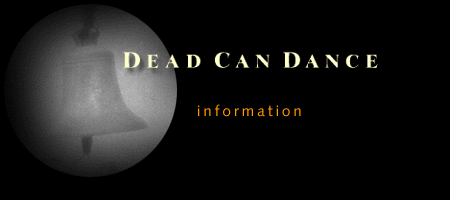-
Global Spirits: Dead Can Dance make world music mystical
By Steve Morse, Boston Globe
12 July 1996
-
Attentive listeners have tried to define the music of Dead Can Dance for a long time. Is it a world
music group, since it has used Arabic chants, Algonquin Indian prayers, Indian ragas, Celtic
bagpipes and Haitian rhythms? Is it a New Age group, since its ethereal vocals echo those of Enya?
Is it a progressive rock group, since elements from Led Zeppelin and George Harrison have turned up
in its sound? Is it a classical group, since string orchestrations have played an important role? Or
maybe a techno group, since the duo has used computer sampling?
All of the above, if you like.
There's no other act quite like Dead Can Dance, whose members have embarked upon an "artisanship of exploration of different musics, structures and colors," says singer Lisa Gerrard. She's been with workaholic partner and fellow global village adventurer Brendan Perry for seven studio albums. The latest is the meditative Spiritchaser, which leads up to the duo's show at Harborlights Pavilion next Friday night.
"There's been a lot of sparks and creative electricity through the years," says Gerrard. "But I think we've really arrived at a creative marriage where we speak with one tongue. It's a really exciting time for us. Either it's the end, or it's the beginning of another genre of the work."
The new Spiritchaser sounds like a beginning. It breaks fresh ground with hypnotic weaves of African percussion, overlaid with the unutterably beautiful voice of Gerrard, an intellectual Australian native who views her voice as representing "an abstract vocabulary that lies within the collective unconscious."
"There's the practical, speaking voice, which I'm using to talk to you now. And then there's the voice of the spirit," says Gerrard, who sings in several languages and sometimes makes up her own words to fit certain melodies and mood states, as on the new song "Devorzhum."
"I know that I'm at my most mature when I sing. And in some ways I feel that because of the dedication to the work, I have stayed a baby in other areas of my life," she says.
So dedicated is the Dead Can Dance duo that they spent nine months crafting sonic textures for the new disc, which was recorded at Quivvy Church in Ireland. "There's a Siamese-twin sort of experience that takes place through the work process," says Gerrard. "We were together seven days a week, working very closely on every nuance of the voice structures and the percussive areas that Brendan mostly came up with.
"Sometimes we can write a piece of music in half a day and it's finished. Other times we'll spend two months on a piece of music, grinding and grinding until you literally dissolve into bits and rebuild yourself in front of this piece of work," she says.
And much of the work is purely intuitive. There's no master plan.
"When Brendan and I work together, we don't speak much. We sing a lot and play a lot and do things like that, but we don't really talk much. We usually only speak when we strike on something. All of a sudden Brendan will turn around and say, `Oh, that's good what you're doing there. Hang on to that.' Or I'll say to Brendan, `Oh, I love that.' So we'll either put it into the computer or we'll explore it further. And we'll explore it until we no longer think it works or it leads us into something else.
"Or we may say, `I feel like I'm in a forest now. Can't you imagine this too?' And if we both agree, then we'll pursue it.
"There are many ways of looking at the work. There are the practical things that take place, that I'd say Brendan has always been the stronger in. And there are the abstract properties that exist within the work that I've always been stronger in," says Gerrard, who also released her first solo album last year (The Mirror Pool).
She readily admits, though, that Perry is the more driven member of the duo in pursuing the ethnic musics that have made Dead Can Dance so hard to characterize. "Brendan's been studying anthropology and has been since I first met him," says Gerrard, who moved with Perry to London in 1981. ``Prior to this new record, he did a study of Haitian music and vodun [invocation] rhythms. And Outo is the spirit that he's talking about. That's the spirit that comes around a percussionist to make it possible for him to communicate with the spirit world."
Occasionally, Dead Can Dance's unlimited explorations - and uncanny ability to internalize music from all over the globe - can lead to problems with the everyday physical world. One minor problem resulted from the new song "Indus," which had a short melodic pattern so similar to George Harrison's "Within You Without You" (from his Beatles days) that the group had to give him partial songwriting credit.
"We don't know whether we stole it or not. We probably did, but who the hell knows?" says Gerrard. "It wasn't deliberate, because we didn't remember the record. I'm really unfamiliar with the Beatles' work, I have to confess. Brendan knows a bit more about it. But the next minute, musicologists are saying, `Oh, the first six notes are the same.' So we had to contact George Harrison, who didn't give a damn, frankly. He was gardening at the time. He said, `Oh, I like that piece of music. It's OK.' But the [record company] pushed it. So we had to give a credit to Harrison on the thing, which seems really bizarre."

information - home
